“I have not offered a small, Band-Aid solution,” Bill de Blasio ’87SIPA told dozens of scholars and advocates in education, health, and social work at Roone Arledge Auditorium in Columbia’s Lerner Hall on November 25. “I have not offered a pilot program or a boutique concept. I have offered a game-changing investment in early-childhood education and afterschool. Nothing less will do.”
De Blasio, the mayor-elect of New York City, had returned to Columbia as the keynote speaker for a daylong conference called the NYC Summit on Children, sponsored by the Earth Institute in collaboration with the Children’s Health Fund. The gathering was organized by Irwin Redlener, director of the Earth Institute’s Program on Child Well-Being and Resilience, a new university-wide academic center to support the healthy development of children, and Jeffrey Sachs, director of the Earth Institute. The program featured three panel discussions relating to early-childhood education, led, respectively, by former New York Times columnist Bob Herbert, broadcast journalist Jane Pauley, and WNYC radio host Brian Lehrer ’96PH.
De Blasio repeated the central message of his campaign, declaring that economic inequality was “the greatest challenge of our time,” and that to attack it, we must “squarely address the challenge of educational inequality.”
Saying that “our city will rise or fall based on our public schools,” de Blasio called for free, high-quality, full-day pre-kindergarten for every child in New York City and free afterschool programming for every middle-school child. He marshaled statistics on the connection between academic improvement and juvenile-crime reduction, noted the extreme demand in New York for pre-K seats, and alluded to the high standards of early-childhood education in Europe, China, and Brazil. In a city in which 46 percent of the residents are living below or near the poverty line, de Blasio said, increasing the hours of learning and supervision is the right thing to do not only for children and their parents, but for the entire city.
“To do this, we will need resources,” de Blasio said. “I proposed over a year ago a tax on those in this city who make a half million or more, for the next five years. It’s a small addition to their local taxation that will make a huge difference in the lives of our children. A transformational difference.”
De Blasio was introduced by President Lee C. Bollinger.
“It’s my pleasure to welcome back to this campus New York City’s mayor-elect Bill de Blasio, who as a young man clearly had the political foresight to pursue his higher education both below 14th Street and above 114th,” Bollinger said. “Even then a coalition builder.” (De Blasio got his undergraduate degree from NYU.) Bollinger noted de Blasio’s victory “places him in a very long line of Columbia alumni as mayors of New York — as well as mayors of an independent Brooklyn, back to when Borough Hall was its own city hall. Clearly, given the sweeping returns on both sides of the river, Bill de Blasio is fully in the tradition of Columbia’s Seth Low, who at different times was elected to both jobs.”
Bollinger traced de Blasio’s career from his start on Mayor David Dinkins’s staff to his work as an official in the Clinton administration under then HUD secretary Andrew Cuomo to his election to the city council and then to the post of public advocate. “Bill de Blasio has always shown a deep commitment to a better, healthier, more just society,” Bollinger said.
In his opening remarks, de Blasio credited Columbia with helping to set him on his political path.
“I came here to study Latin American affairs and get my master’s degree,” he said. “I came here as someone seeking out great thinkers and perspectives, and I found very, very quickly at Columbia that people were rooted in New York City, in the world around us — I found a lot of people who cared about making a real impact in the world right away. And that’s part of what led me to get involved, after getting my master’s degree, in issues related to Central America and US foreign policy related to Central America.
“Some see that as controversial. I see that as natural — that we were living in a time that demanded that people respond to injustice. And I can certainly say that that spirit to address the issues we were confronting and believe we could do something about it, believe that nothing was so set in stone that it couldn’t be overcome or addressed — I felt a lot of that spirit in the years I was here at Columbia, and it fueled a lot of what I was able to do thereafter.”



